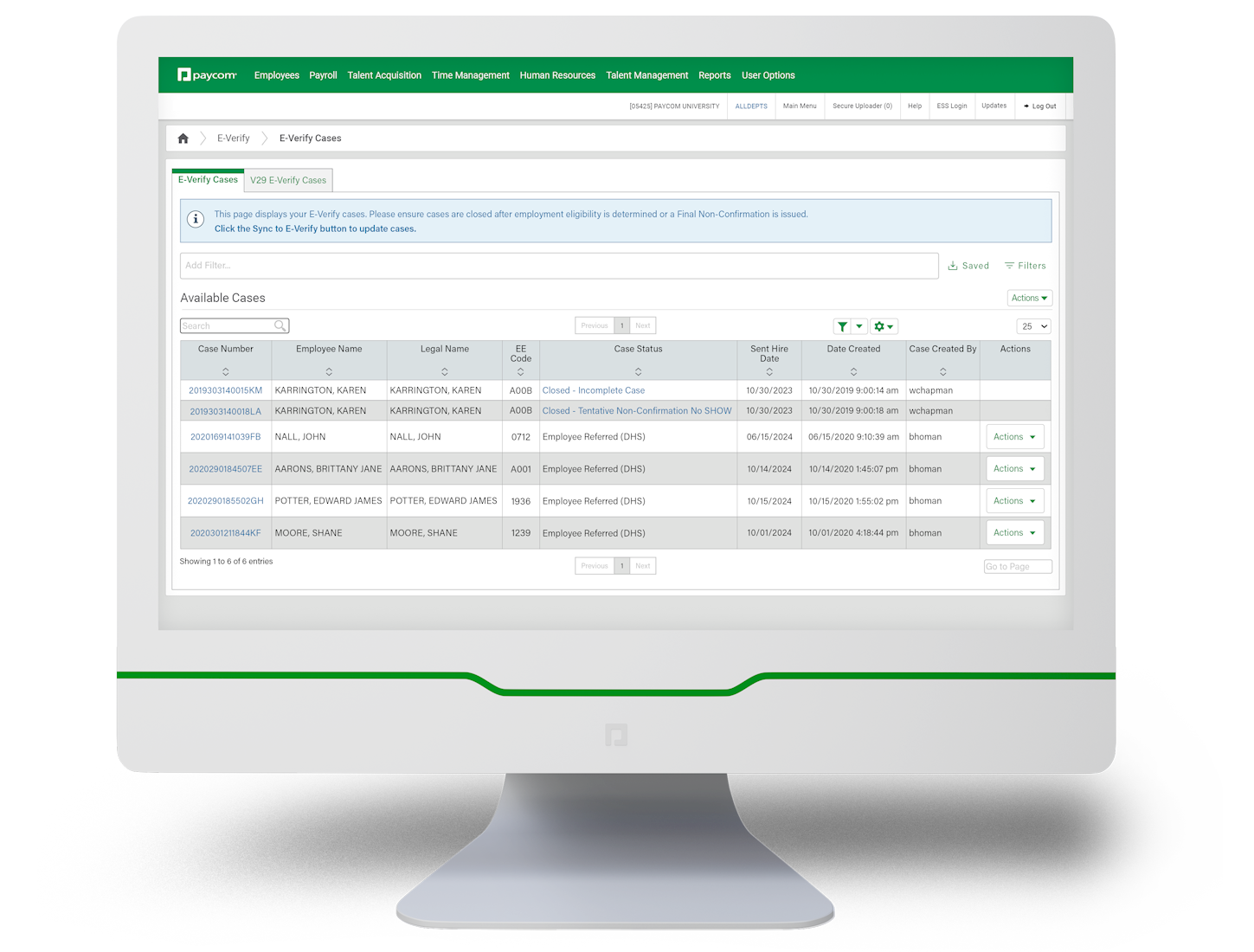E-Verify®
Instantly confirm employment eligibility with our E-Verify software for your peace of mind

Software overview
Take the stress out of I-9 verification
With our seamless E-Verify functionality, you’ll never have to wonder about employees’ U.S. work eligibility. It provides instant and automatic Form I-9 verification within Paycom’s single software. No need to register with a different website, reenter employee data or juggle separate systems. Our E-Verify tool allows you to manage cases in the same convenient place you manage employees.

- Confirm employment eligibility in the same software you use daily.
- Do your due diligence while avoiding time-consuming data reentry.
- Lighten your workload with automatic reminders and notifications.
- Reduce your exposure to fines, audits and other steep penalties.
- Boost completion rates with electronic signature verification.

How it works
Automation for I-9 peace of mind
I-9 compliance is a big deal, but it doesn’t have to be a huge burden. With Paycom, E-Verify tasks automatically flow to onboarding and other relevant employee checklists. From account registration to audit prep, it’s that easy.

Proactive submissions
As soon as your new hire provides their I-9 info during onboarding, their data prepopulates a new E-Verify case.

Instant results
Our E-Verify tool immediately checks employment eligibility. Any tentative nonconfirmation cases instantly sync with the tech’s results.

Automatic notifications
E-Verify automatically notifies you 90 days before an employee needs I-9 reverification.
How it helps
Reduce your exposure risk
Shield your business from I-9 fines
When just one I-9 violation can exceed $5,000, determining employment eligibility is undeniably important. Our E-Verify software helps protect you with automated reminders and industry-leading security standards, so I-9 data is shared only with those who need it.
Monitor it all on an easy-to-use dashboard
Don’t leave compliance to chance. Our E-Verify dashboard makes it easy to submit cases in one click, view their statuses and access any expiring documents. Plus, you can quickly let managers know about reverifications and anything you might need from their teams.

See what people are saying about Paycom
Frequently asked questions
Learn more about I-9 verification and employment eligibility
E-Verify is an online system that confirms an individual’s identity and eligibility to work in the U.S. It works by checking information from a completed Form I-9 against records from the Department of Homeland Security and the Social Security Administration.
E-Verify makes it easier for businesses to determine if their employees can legally work for them. The tool is easily implemented in onboarding since an employee must provide a completed Form I-9. Additionally, certain states require certain employers to use E-Verify.
Form I-9 verification is the process of verifying an employee’s eligibility to work in the U.S with the Department of Homeland Security. While citizens and noncitizens must complete this form, employers must determine if the documents their people provide authorizing their work eligibility are genuine and accurate. Businesses must then retain their workforce’s I-9s for federal audits or inspections.
Yes! Paycom offers both training videos and step-by-step guides for completing E-Verify through our tool.
Our software automatically notifies you 90 days before an employee needs Form I-9 reverification.
Paycom helps reduce the risk of personally identifying information getting in the wrong hands with certificate-backed data security and access only to authorized users.
Yes! Once an employee fills in their information within Paycom, their Form I-9 prepopulates a new employment verification case with no data reentry needed.
Although E-Verify is voluntary for most employers, some circumstances require enrollment, including:
- federal contracts or subcontractors that contain the Federal Acquisition Regulation (FAR) E-Verify clause
- employers residing in states with mandated legislation
- the result of a legal drug ruling
Paycom’s E-Verify tool provides an easy and effective way for employers to stay in compliance with these regulations by running employment verification checks from within our secure single software, without the need to reenter data.
With Paycom’s single software, data flows seamlessly systemwide, with no reentry required. Plus, with certificate-backed data security and access only to authorized users, employers reduce their risk of confidential information getting in the wrong hands.
E-Verify tasks automatically flow into new-hire and employee checklists, so employees are prompted to fill in the needed information. Once employees enter their data, their Form I-9 information prepopulates new employment verification cases with no additional effort. Paycom’s E-Verify tool then instantly alerts employers whether a new hire is eligible to work in the U.S. Once the process is complete, verification documents flow directly into employees’ personnel files, and when it’s time to reverify, Paycom automatically notifies you 90 days beforehand.
